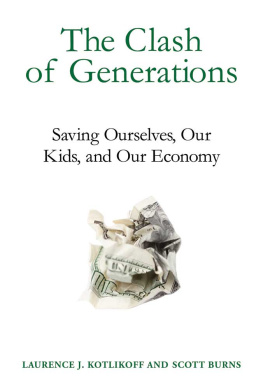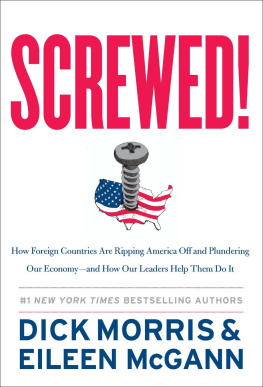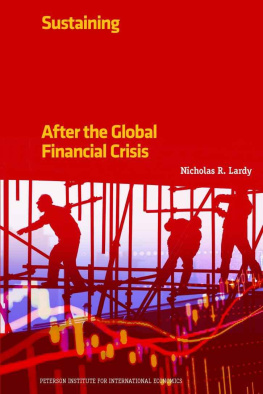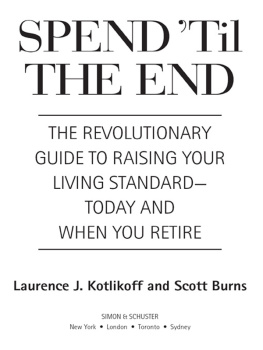The Clash of Generations
The Clash of Generations
Saving Ourselves, Our Kids, and Our Economy
Laurence J. Kotlikoff and Scott Burns
The MIT Press
Cambridge, Massachusetts
London, England
2012 Massachusetts Institute of Technology
All rights reserved. No part of this book may be reproduced in any form by any electronic or mechanical means (including photocopying, recording, or information storage and retrieval) without permission in writing from the publisher.
For information about special quantity discounts, please email .
Library of Congress Cataloging-in-Publication Data
Kotlikoff, Laurence J.
The clash of generations : saving ourselves, our kids, and our economy / Laurence J Kotlikoff and Scott Burns.
p. cm.
Includes bibliographical references and index.
ISBN 978-0-262-01672-8 (hardcover : alk. paper)
ISBN 978-0-262-30079-7 (retail e-book)
1. United StatesEconomic conditions21st century. 2. Budgets deficitsUnited States. 3. Generational accountingUnited States 4. Fiscal policyUnited States. I. Burns, Scott. II. Title.
HC106.83.K68 2012
330.973dc23
2011040596
10 9 8 7 6 5 4 3 2 1
d_r1
For our children and yours
Acknowledgments
This book owes a great debt to Ellen Faran, director, and John Covell, economics editor, at the MIT Press. John pushed us to write the book, and Ellen provided critical and steadfast support for the project. Both were exceptionally patient as we tussled vigorously over the title, but finally converged on The Clash of Generations.
Were also extremely thankful to the rest of the highly professional staff at the MIT Press for their care and skill in preparing the manuscript and helping us make changes to create a better book, designing the books cover, and bringing the book to market.
Larry is a professor of economics at Boston University and warmly thanks his beloved university for its steadfast support of his research and engagement with the public on key economic issues.
Scott thanks his business partner at AssetBuilder, Kennon Grose, for his amazing patience, and his wife, Carolyn, for her much appreciated support. He gives his biggest thanks to his five grandchildren who remind him by their smiles, hopes, and worries of why this amount of work, on this particular subject, is so important.
Prologue
The Last Straw
The day was comingfor years, decades, really.
Warnings had been sounded, loud, clear, and often.
Most heard, few listened. The problem was distant, its size unclear.
No worries. Well fix it. The next election, the next party, the next leader.
There was time.
There wasnt.
The contract was simple: 100,000 barrels of oil, delivered to this country, at this port, on this day. Payment in Chinese yuan.
The seller was big and always insisted on dollars.
Not that day.
Thanks to U.S. pressure, the yuan was floating free. You could buy and sell it anywhere.
The yuan was strong and rising. The dollar was weak and falling.
No wonder: Americas economy was awful; over 30 million, mostly young, looking for work; and Uncle Sam was broke. But Sams ace in the hole was the dollarthe worlds reserve currency. If Sam needed money, hed print it, and everyone would take it.
No longer.
Our shareholders come first. The dollars too risky. Lets settle in yuan.
And so the contract said yuan.
The medium of exchange was the message, and the message was broadcast, posted, e-mailed, tweeted, Facebookd, and texted around the globe, in seconds.
They switched. We should too.
Denominating contracts in anything but dollars became routine.
If only. If only that company had waited or kept it quiet. If only that company was smaller or foreign.
But there it was. A major U.S. oil company had publicly called it quits on the greenback.
Americas economic death was quick and painful.
In short order, the dollar plunged. Interest rates soared. Bond and stock markets vaporized. Towns, cities, states, and businesseslarge and smallstarted declaring bankruptcy.
And massive layoffs began. The young got the first pink slips.
The Fed rode to the rescue.
Not to worry. Well print more dollars, buy bonds, and lower rates.
Worked before.
You need a loan. Step right up. Weve got money.
This time was not different.
This time, ancient economic law prevailed: more money begets higher prices.
With prices rising, the dollar became a hot potato. No wonder. The longer you held it, the less it would buy.
And faster money pushed prices even higher.
Next came the bank runs.
Deposit insurance didnt matter. Everyone wanted to get and spend their money before it became worthless.
Uncle Sam printed trillions of dollars to honor insurance and other guarantees to depositors, money market funds, bondholdersyou name it.
Inflation reached double digits.
Per month, per week, per day, per hour.
The economy was unraveling.
And then the next generation took to the streets.
The United States Is Bankrupt
Economic meltdowns are as much psychological events as they are economic ones. They hit when people panicwhen they see enough evidence of private or public financial turmoil or malfeasance to realize its time to take their remaining money and run. Before 2008, no one would have viewed a wholesale U.S. economic meltdown as remotely plausible. But that terrible year changed everything. It turned our economic world upside down.
In 2008, we discovered that Wall Street was no longer safe for Main Street, that it had systematically produced and sold trillions of dollars of fraudulent securities, and that it was aided and abetted in this racket by regulators on the make, politicians on the take, rating companies on the fake, and directors on a break.
Countrywide Financial, Bear Stearns, IndyMac Bank, Fannie Mae, Freddie Mac, Lehman Brothers, Merrill Lynch, AIG, Washington Mutual, Citigroup, and Wachoviaeach of these financial behemoths trafficked in toxic assets and each failed, was rescued in a shotgun wedding, or became wards of the state. The specter of so many financial giants going under panicked our nations leaders as well as the public. Everyone decided bad times were here and took steps to ensure that outcome.
Consumers stopped buying. Companies started firing. Unemployment skyrocketed, leaving 15 million Americans out of work, 1 million too discouraged to look for work, and millions more working fewer hours for less pay. The stock market plummeted. In only sixteen months, it stood at 44 percent of its October 2007 peak. The Fed printed $1.6 trillion, more than doubling the basic supply of money, hoping to keep the economy afloat. (After that, it printed another $600 billion.) And the Treasury expended vast sums to stimulate the economy, running massive deficits in the process. Through it all, the public and the rest of the world decided U.S. government bonds were the safest securities on earth.
Nothing was further from the truth. The United States was, and is, in worse fiscal shape than many other countries commonly regarded as basket cases.
We made this point in our 2004 book, The Coming Generational Storm, which laid out our nations grave long-term demographic and fiscal problems and their extremely troubling implications for our children. What was true then is triply true today. Rather than heed our warnings and those of many others, the government has taken one step after another to dig our nation a much deeper hole. Our fiscal problems are now so severe, our economic institutions so poorly structured, our financial system so fragile, our politicians so divided, our foreign competition so intense, and our countrymen so anxious, that major social strife could occur at any time. This book makes that clear. But it also offers a path forward for ourselves, our kids, and our economy. And Lord help us if we dont take it.
Next page





